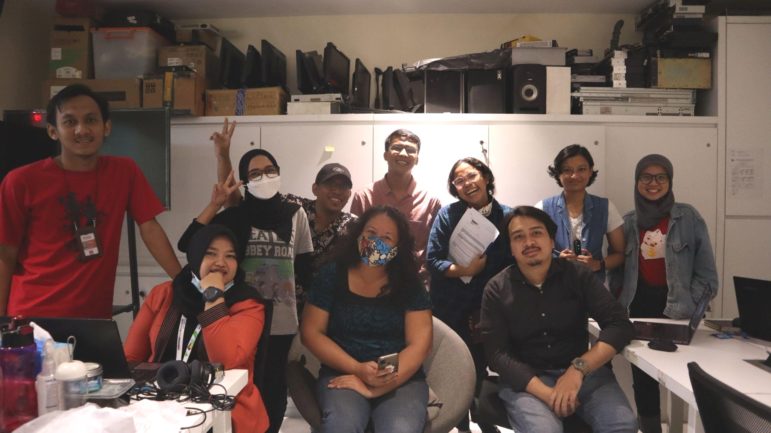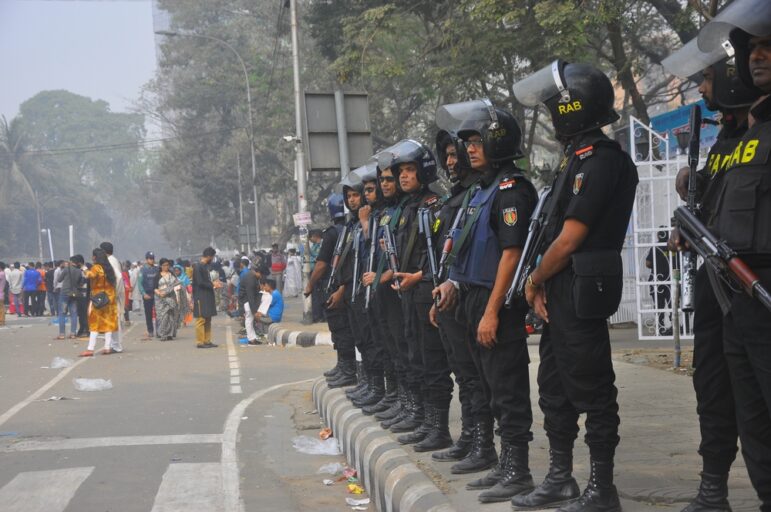

Image: Shutterstock
Journalism Under Siege: Five Survival Tips from Editors in India and Hungary
Read this article in
This story was originally published by The Reuters Institute at the University of Oxford and is republished with permission. You can find the original here.
As so many countries face democratic backsliding, journalists face more obstacles to keep reporting on issues that are important to their audiences. At the Reuters Memorial Lecture this year, panelists from Nicaragua and Venezuela stressed that the decline in press freedom in their own countries should be a warning for the rest of the world.
“People believe democracy is forever, and we’re showing you that’s not the case,” Venezuelan editor Luz Mely Reyes said.
The efforts of journalists in authoritarian countries are often heroic, as they can face lengthy prison sentences and violence in response to their work. But how do news organizations stay afloat in countries like India and Hungary, that still keep a democratic facade but are increasingly arbitrary and repressive, and restrict the space for public contestation, political participation, and press freedom?
I spoke to Peter Erdelyi and Ritu Kapur to find out what journalists can do to keep their reporting going amid democratic backsliding. Erdelyi is a former journalist fellow of the Reuters Institute for the Study of Journalism and until recently held the position of director at the Hungarian online newspaper 444.hu and fact-checking website Lakmusz. Kapur is a member of the Institute’s advisory board and the founder and CEO of the Indian mobile-first digital news platform The Quint.
The 2023 Press Freedom Index from Reporters Without Borders (RSF) classifies the situation in Hungary as problematic. The organization has called Hungary’s strongman president Viktor Orbán a “press freedom predator.” In India, a country often referred to as the world’s largest democracy, RSF deems the situation for press freedom “very serious,” with 10 journalists detained and one killed since the start of the year.
What Can Journalists Do?
Hungary and India are both experiencing democratic backsliding, but they are at different stages of this process. This in turn affects how journalists can operate in the country. “The way journalists should act depends on the level of democratic degradation and on the level of fightback that’s still possible,” Kapur says.
Journalists’ experiences in hostile environments will vary widely, depending on their age, gender, race and ethnicity, sexuality, and belonging to other marginalized groups. Women, for example, are more likely to face online abuse, and the kind of abuse they face is particularly vicious, as the experiences of Brazilian journalist Daniela Pinheiro and American disinformation researcher Nina Jankowicz show.
This is often even worse for women of color and for people who are at the intersection of another marginalized identities, like Muslim women in India, who have faced intense campaigns of social media harassment, including online ‘auctions.’ This is a form of targeted online harassment where prominent Muslim women’s pictures and identities are publicized on websites or apps for a mock auction.
While keeping this in mind, there are at least five lessons we can draw from the experience of journalists who have built and developed newsrooms in the face of growing pressures that can be useful to their colleagues around the world.
1. Focus on Producing Solid Journalism
Accuracy is a cornerstone of all journalism. But this is especially true for reporters working in hostile environments, where mistakes can have a devastating impact on an outlet that’s already struggling. “Don’t try to be quick or sensational, just make sure that [what you publish is] absolutely, indisputably solid,” Kapur says. “If you leave even a small window open to interpretation, you are opening yourself up to risks.”
A crucial role for journalists in countries with backsliding democracies is holding the powerful to account, but the challenges journalists themselves face should not sway the way they report on these individuals. “Do not play into your own biases, because then you lose the trust of your readers,” Kapur warns.
Another lesson Kapur shared from The Quint’s experience is to use the resources you have to maximize your impact. When The Quint was founded in 2014, India was 140th out of 180 on RSF’s Press Freedom Index (this year, India’s position is 161st). As many digital outlets did in the mid-2010s, The Quint tried to do everything by publishing copious numbers of articles and videos every day. More recently, Kapur says, the outlet has drastically cut its output: from publishing around 300 pieces a day to just 30 — a 90% decrease.
Instead of overwhelming its audience with content, The Quint now focuses on impact and telling untold stories, she says. The way they measure their success has also changed, with a move away from pageviews and numbers and towards encouraging their readers to be part of the debate.
As part of this shift, the outlet uses social media for content distribution and to foster engagement. “On platforms like Instagram, we consciously create content in the format and style of the platform. But even in doing so, we are mindful of using these formats as a teaser to drive audiences to our site. YouTube, on the other hand, works as an important platform for us, as it’s the primary place for consuming videos,” Kapur says.
2. Stay Financially Viable
This leads to the issue of finances: in order to have an impact on your audience, foster healthy public debate, and even do the most basic work of journalism, there has to be enough money for the outlet to stay afloat.
This applies to news organizations operating in all environments, but is especially important when journalism faces the challenges posed by a hostile political environment.
In India, for example, newsrooms are charged with economic crimes, such as money laundering or tax evasion, Kapur says. This is a change from more traditional judicial tactics used against journalists such as defamation charges, and are particularly damaging due to the slow legal process, the travel restrictions that may be placed upon individual journalists (as experienced by Rana Ayyub in 2022), the reputational damage that undermines the credibility of the outlet and of journalism in general, and the high financial cost.
Despite these difficulties, now is not the time for paywalls in India, Kapur says, in order to ensure as many people as possible still have access to reliable sources of information. Unfortunately, staying financially viable as a news organization in a difficult environment often means fewer jobs for journalists. Asked how The Quint is surviving, Kapur highlights that the outlet is much smaller now than a few years ago, also reflecting the drop in output. The team is also experimenting and “getting more agile with tools which require less human resources,” she says.
The Quint currently employs 143 people, of whom 70 are journalists. Its revenue last year was around US$5 million. The main source of revenue is online advertisements. This can be tricky in a country experiencing democratic backsliding: Kapur says news organizations looking for advertising revenue sources “can’t be too puritanical,” but she also stresses that it’s important to know where the line is in terms of sponsorships and adverts they accept. For example, The Quint doesn’t host government advertising. The outlet is funded by Meta as part of the company’s fact-checking program.
3. Tap Into Your Audience’s Support
In some countries experiencing democratic backsliding, the advertising market is already too hostile for news organizations to rely on. An alternative model used by some outlets is reader revenue, especially through memberships. This is the solution found by 444.hu as a direct result of government interference in the advertising market. Erdelyi explains: “Initially we didn’t have plans for audience revenues and for three years we tried to make it without them. But then there was so much government interference in the advertising market that we realized that we were not going to stay alive on that alone.”
444.hu’s membership scheme was born out of a lengthy process: it was four years from when they began experimenting to launching a fully-fledged membership in August 2020, Erdelyi says. They first launched donations in 2017 and then experimented with crowdfunding.
“Because it was gradual,” he says, “we already had a group of people who had been supporting us. The difficulty was spread out over the course of a number of years, so we had room to learn and fail and experiment.”
Today 444.hu has around 22,000 paying members, says Gabor Kardos, CEO of 444.hu’s publisher Magyar Jeti Zrt. Just over half of the publisher’s annual revenue comes from reader revenue sources, with the rest mostly coming from advertising and a smaller proportion from other sources such as grant projects.
The publisher’s overall revenue in 2022 was around US$2.7 million. However, this number depends on the volatile conversion rate between the euro and the Hungarian forint, Kardos says. Magyar Jeti Zrt employs 30 full-time journalists in 444.hu and 10 more in two sister outlets that also publish their content on the 444.hu landing page: science magazine Qubit and fact-checking outlet Lakmusz.
Audiences in backsliding democracies, like audiences everywhere, choose to pay for journalism for a complex set of reasons.
The Reuters Digital News Report 2023 found that, in the UK, the US, and Germany, the most important stated reason to subscribe to online news is to get access to better quality or more distinctive journalism, with 65% of US respondents who pay for online news choosing this option, as well as 48% in the UK and 44% in Germany. Another reason given was to help fund good journalism, which was particularly prevalent in the US, a politically polarized market, with 38% of news subscribers choosing this as the most important reason why they pay for news.
Researchers didn’t ask those questions in Hungary, but similar dynamics may be at play: there may be an additional push for people unhappy with the government to join a membership scheme like 444.hu’s.
“I would say that in environments like ours, choosing to support independent media can be an act of political expression,” Erdelyi says. However, that feeling itself is not enough for a person to commit to giving money regularly. “This sentiment can be useful for donations and a powerful driver for conversions, but if you want to keep people around for retention, you need to provide them with services they really use and take advantage of," he says. "So this itself may be good for that initial sort of breakthrough, but if you want to keep them, you need to come up with services and benefits that you offer to them that they see as value.”
4. Speak Out and Stand Together
One key piece of advice Kapur shares is to unite with other outlets: to join a body if it already exists, or if not to create one. This is not the time to compete with one another, but to stand together, she says. This way, if one outlet or one person is under threat, others will rally to help them.
Groups are also useful for campaigning, for example, for laws that better safeguard journalists. The Quint was involved in establishing an organization that represents digital-only publishers, Digipub India Foundation.
Similar initiatives can be found in other countries. In Venezuela, a country further along in the process of democratic backsliding and in which reporters face many obstacles, a group of journalists have recently launched the group Alianza ProPeriodismo, with the goal of fostering connections and promoting the defense of independent journalism in the country.
The same is happening in Guatemala, where journalists are building alliances resulting in projects such as Guatemala Leaks, an independent and secure platform to confidentially share information of public interest, La Linterna, a collaborative fact-checking project against disinformation in the upcoming general elections, and No Nos Callarán (They Will Not Shut Us Up), an organization created to protest against the persecution of the press in the country.
Countries such as Hungary and Poland are particularly sensitive to international pressure because of their European Union membership, which requires their adherence to principles such as the rule of law and fundamental rights for citizens in order to access funds and other benefits. This means that independent journalists speaking out about their struggles and garnering international attention are more likely to have an impact on these countries’ domestic policies.
“Attention and publicizing the issues that we have, whether it comes to the distribution of public advertising or smear or restriction on the access of public information, are things the government has to pay some attention to,” Erdelyi says. “While it may not change existing policies and still allows things to deteriorate to some extent, it may prevent some even more outrageous things from happening.”
5. If You Have To, Leave the Country
If the situation becomes untenable, journalists may choose to or be forced to leave the country they’re reporting on, a drastic but sadly increasingly common case, particularly for countries further along in the backsliding process. “People outside the country can do meaningful work without threat,” Kapur says.
Examples of journalists leaving their country to keep reporting on it are rife in Latin America and many journalists from Cuba and Nicaragua have been forced into exile. Since the all-out invasion of Ukraine began in 2022, many Russian independent journalists have also had to leave too.
This option has obvious drawbacks: not being in the country you’re reporting on makes it harder to conduct investigations, verify information, and contact sources.
In a recent seminar researcher Louisa Esther Mugabo, who is studying the phenomenon of contemporary exile journalism, said journalists forced to work from abroad should “prioritize networks inside the country, contacts that [they] have verified for years, contacts that [they] trust, and have contacts that are independent of each other because that's eventually going to be crucial for [them] and [their] sources' safety.”
One option for outlets facing legal obstacles, such as the economic crime charges that are now common against Indian newsrooms, may be to stay physically in the country but register abroad. However, this can open outlets up to accusations of being ‘foreign agents,’ as happened recently in Russia and other countries.
Many journalists around the world are facing growing obstacles to their reporting, threats to their independence, and harassment of their journalists. However, by addressing the situation head-on and implementing product and revenue strategies that take this into account, media outlets can survive and in some cases thrive in hostile environments. For outlets operating in the relative safety of more stable democracies, reporting on these issues and highlighting them is a way to support their colleagues and their work.
Additional Resources
Why Journalists in Autocracies Should Report as If They’re in a Democracy
Resources for Tackling Authoritarian Threats on International Day of Democracy
Hungarian Investigative Newsroom Átlátszó Targeted in Pro-Government Smear Campaign
 Marina Adami works as a digital journalist at the Reuters Institute for the Study of Journalism at the University of Oxford. Originally from Italy, she has reported on breaking news for Politico Europe in Brussels and on local news in London.
Marina Adami works as a digital journalist at the Reuters Institute for the Study of Journalism at the University of Oxford. Originally from Italy, she has reported on breaking news for Politico Europe in Brussels and on local news in London.









